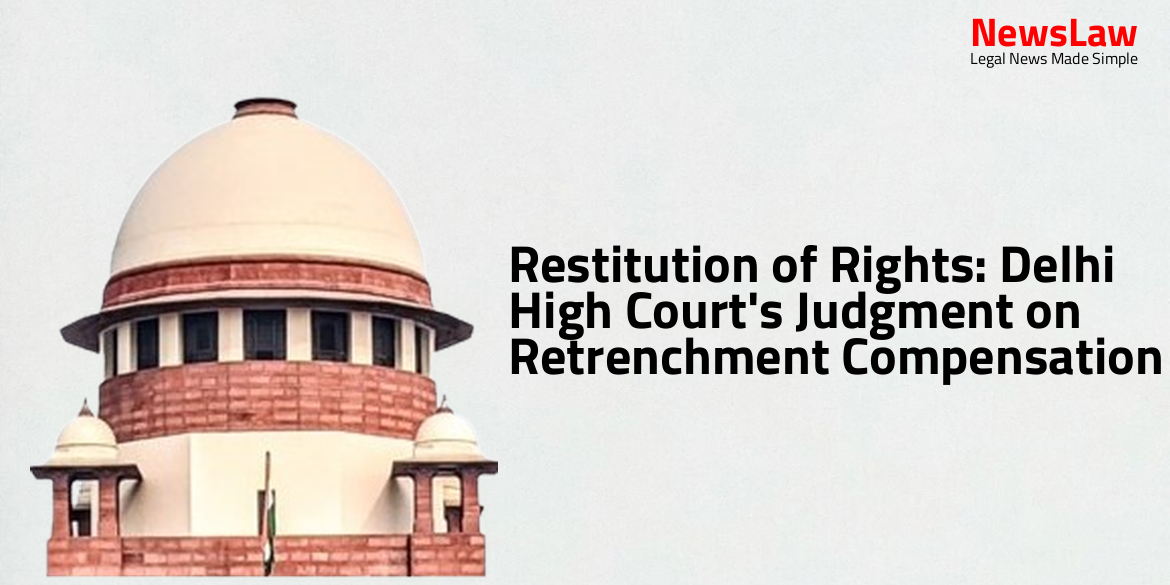In a significant ruling by the Delhi High Court, the case concerning the workman and management’s dispute over retrenchment compensation has been resolved. The court’s judgment focuses on ensuring fairness and restitution for the affected parties, highlighting the need for proper compensation as per labor laws. This decision marks a crucial step towards upholding justice in labor disputes involving the Industrial Tribunal’s previous designation and the subsequent retrenchment compensation issue.
Facts
- The workman failed to appreciate that the judgment of the Industrial Tribunal-I in the designation case does not provide a ‘skilled’ designation as per the scheduled employment.
- The workman has always received a salary prescribed for unskilled work and never objected during their employment.
- The stay was wrongly entangled with judgments of unrelated cases, showing a lack of urgency from both parties in seeking a stay.
- The Union did not pursue the implementation of the impugned Award, indicating a lack of urgency on either party’s behalf.
- The stay application was pending from the inception of the case, yet both parties showed no urgency in the matter.
- The Labor Court found that Sections 9A and 25-N of the Act did not apply to the case.
- The claimant did not work with the management from the date of transfer until rejoining, entitling them to retrenchment compensation as per Section 25-F for the period actually worked.
- The order of the POIT declaring the transfer of 20 workers illegal was stayed by the Delhi High Court in 2006, impacting the claimant’s service being retrenched after many years of the initial stay.
- The management was not justified in including the period from transfer to rejoining in the total working period for calculating retrenchment compensation.
- The Labor Court awarded the workman a lump-sum compensation of Rs.200,000/- along with 9% interest per annum till payment.
- Reinstatement was not feasible as the management was close to shutting down, hence the workman was entitled to wages of the skilled/semi-skilled category which were unpaid.
- The calculation of retrenchment compensation using the last drawn salary instead of the skilled and semi-skilled worker wages as designated by the POIT was deemed improper by the ARW.
Issue
- Issue 2 pertains to the reliance of the stayed award of the Industrial Tribunal by the Labour Court.
- The Workman in question was receiving a salary as an ‘unskilled’ laborer throughout their employment.
- The key question is whether the Labour Court was justified in awarding compensation based on the previously stayed Industrial Tribunal award.
- The petition calls into question the validity of the Labour Court’s decision in light of the stayed Industrial Tribunal award.
- The crux of the matter is whether the Labour Court’s judgment should be challenged under Article 226 of the Constitution of India.
Arguments
- The petitioner argues that the impugned award was passed without considering all facts and circumstances of the matter.
- The petitioner highlights that despite the Industrial Tribunal declaring transfer orders as illegal, the petitioner took the matter to court to avoid liability under section 17B of the Act.
- It is mentioned that the workman is facing repercussions for forming a union to address grievances before labor authorities.
- The petitioner contends that the retrenchment compensation issue is not clear-cut and does not involve any malicious intent.
- The petitioner asserts that the court cannot reevaluate evidence and material on record in the writ jurisdiction unless there is evidence of illegality or perversity.
- The petitioner argues that the impugned award was rightfully passed by the Labor Court.
- The Ld. ARM argued against granting designation to the claimant, stating that retrenchment compensation and notice pay were correctly calculated based on their last drawn wages and not the award dated 29.09.2009.
- The claimant had previously filed a case against their transfer, with the POIT ruling that they were performing unskilled work. This award was not challenged by the claimant before any forum, making it final and operating as res judicata.
Analysis
- The learned Labour Court held the retrenchment of the worker was in violation of Section 25F of the Act.
- The retrenchment compensation was wrongly calculated based on the worker being an unskilled laborer, while the Industrial Tribunal earlier designated him as a skilled/semi-skilled worker.
- The management erred in not calculating notice pay and compensation as per the 2009 award, violating Section 25-F of the Act.
- The seniority list displayed and sent to the Labor Department indicated that the worker was among the junior employees retrenched.
- Despite the Industrial Tribunal’s designation in 2009, the compensation at the time of retrenchment was not based on the skilled/semi-skilled category as required.
- The provision of Section 25-N was not applicable to the case.
- Issue no. 1 was decided in favor of the worker, finding the termination to be retrenchment in violation of Section 25F.
- The witness testimony and evidence presented before the Court formed the basis of the decision.
- The award dated 29 September, 2009, granting the designation, was considered in calculating compensation despite being stayed later on.
- The petition management’s argument against the award being passed during the pendency of another matter was rejected.
- The worker had rendered continuous service and was entitled to compensation based on the skilled/semi-skilled category.
- Section 144 CPC allows for variation, reversal, setting aside or modification of a decree.
- Successful party at the final stage can demand restitution to be placed in the same position as if the interim order had not been passed.
- Judicial precedents emphasize the duty of the court to restore parties to their pre-interim stage position.
- Case examples such as Nava Bharat Ferro Alloys Limited v. Transmission Corporation of Andhra Pradesh Limited illustrate the principle of restitution for successful parties.
- The interest during the stay period must be paid as part of restitution upon dismissal of the writ petition or proceedings.
- Imposition of a stay on enforcement or payment obligations must be considered in the context of restitution upon final decision or dismissal of proceedings.
- The distinction between repeal and suspension of law implies that repeal removes the law entirely while suspension only holds it in abeyance.
- Judicial opinions like in Shree Chamundi Mopeds Ltd highlight the necessity of restoring parties to their original position post-dismissal or final decision.
- In the current case, the Industrial Tribunal’s award in favor of the workman was upheld post-dismissal of the writ petition, necessitating restitution to the pre-stay position of the parties.
- Restitution is essential to ensure fairness and prevent financial loss to the successful party unjustly.
- Section 25-F of the Act specifies conditions for retrenchment of a workman.
- Employer must give one month’s notice or pay wages in lieu of notice.
- Compensation equivalent to fifteen days average pay for every completed year of service to be paid at the time of retrenchment.
- Notice to appropriate government and requirement of at least one year of continuous service for valid claim.
- The Court finds no merit in the petitions and upholds the findings of the Labour Court.
- The petitioner management failed to present compelling arguments in their favor.
- The Labour Court’s findings in all the connected matters were similar, stating that the workmen were illegally retrenched without proper compensation.
- The retrenchment was deemed illegal as the workmen were not compensated according to their designations.
Decision
- The issue before the Labour Court was to determine the legality and justification of the workman’s retrenchment.
- The Labour Court found in favor of the workman, ruling the retrenchment as illegal and unjustified.
- The management has been directed to pay Rs.2,00,000/- to the workman within one month, with 9% interest per annum if delayed.
- Parties are to bear their own costs.
- The award is to be published by the Govt. of NCT of Delhi.
- The case files are to be archived.
- The judgment upholds the Labour Court’s decision and dismisses pending applications.
Case Title: SAWHNEY RUBBER INDUSTRIES Vs. SH. KRISHNA PANDIT (2024:DHC:4569)
Case Number: W.P.(C)-6525/2020



